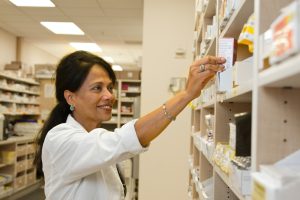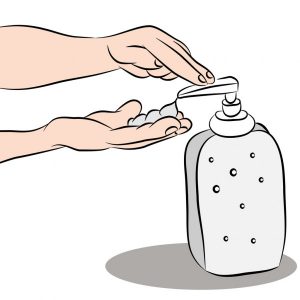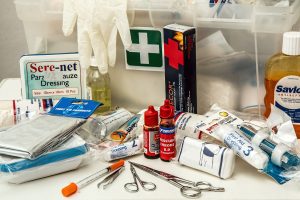#GovtoPrivate: Community Pharmacy

In this series, ex-government contract pharmacists share their experiences in transitioning to the private sector in Malaysia. This article focuses on community pharmacy.
Have you ever stepped into a community pharmacy and imagined putting yourself in the pharmacist’s shoes, while wondering how different it would be compared to the government setting?
If yes, you’re in luck. 2 ex-government contract pharmacists, Run Shi and Sean Liew made the leap to community pharmacy and are sharing their unfiltered experiences in this article.
With that said, let’s dive in.
1. Tell us a little bit about your career background.
Run Shi: After graduation, I started my PRP journey in Hospital Sungai Buloh. After PRP training, I obtained my FRP license and worked in the same hospital.
During FRP, I was placed in the PKKN outpatient department (also known as National Leprosy Control Centre which is opposite the hospital). I finished my one-year FRP service there and continued working there for another 7 months, before leaving KKM to pursue a career in community pharmacy.
Sean: I started my PRP in Klinik Kesihatan Kuala Lumpur as I had a great interest in primary care at the time. Then I was assigned to Hospital Putrajaya to serve my compulsory contract service for first-year FRP. Overall, I served in the public sector for a total of 16 months before I left KKM.
2. How did you prepare yourself for private opportunities?
Run Shi: A few months before the permanent posting result, I decided to hunt for jobs. I always survey the job scopes of the job that I’m interested in applying for. I also started to build up my LinkedIn profile.
Besides that, I sought advice from seniors who are in private companies. During that time, I had the desire to apply for a Medical Science Liaison role in the pharmaceutical industry. I would apply whenever there were job openings for that position.
I had been called in for a few job interviews. However, there were times when my application received no reply or I was not qualified for the interview due to not fulfilling their company requirements. In the end, I made a switch of mindset to join the community pharmacy setting as I had experience working as a locum pharmacist during my FRP year.
Sean: It was my plan to leave the government sector eventually, although the exact timing was not determined. Therefore, I always seek to learn and understand what is happening outside the public sector as well as consistently attending different events to build my network and engage in conversations that provide valuable insights. I have never been complacent at any stage of my career and always strive to improve myself.
3. What did you learn throughout transitioning from government to private? What are the differences in experience between working in government and in private?
Run Shi: I learned to establish a clear decision on my career path. To be frank, I was clueless at the beginning about which will be the right path for me. I’m grateful for the advice and support from peers around me to help me make the right decision.
Besides that, I learned to always embrace failures with an open heart and keep my options open. Every interview is an opportunity for me to brush up on my interview skills and confidence. At the same time, I always keep myself involved in different activities to polish my soft skills.
In the private sector, I learned to be agile and resilient in any kind of situation. Undeniably, it is always tough in the beginning. I also learned to be adaptive in daily situations and embrace any challenges that arise.
I would say the difference between working in government and in private is the working culture. When it comes to the private sector, employers will expect you to be more proactive in learning and you have the autonomy to make decisions. However, in the government sector as contract pharmacists, we are not given any career development opportunities and decision-making responsibilities.
Another difference is in the private sector, the salary is based on your working performance. If you outperform you will get an increment in salary. Meanwhile, in the government sector, salary is based on the grading system and it will stay the same even with the extra workload.
Sean: Malaysia’s public healthcare facilities carry the highest load in our country’s healthcare delivery system. Serving in the government sector has provided me insights into the operation of this system, the working culture, communicating with different healthcare professionals, and how to give the best care to patients under the insufficiency of funds and resources.
It also enabled me to think about what can be improved from micro- and macro perspectives in order to maintain optimal sustainability in healthcare, while providing sufficient space for growth and continuity of patient care.
Most importantly, the journey of serving in the public sector has helped to solidify the healthcare practitioner core values within me, upholding the value, empathy, and compassion of “do no harm” in whatever decisions I make. I constantly think of what I can do to make the current situation better, which leads me to explore and learn about the private healthcare system.
The pace of working in the private sector is faster, and being in the Corporate department, the challenges and expectations are different too. One of them is that the private sector is more open to new ideas and constructive changes as compared to the public sector. I had more opportunities to speak, explore, and engage in discussions whenever there were new ideas.
4. What is your advice for contract pharmacists who wish to transition to this field?
Run Shi: My advice for contract pharmacists who wish to transition to this field is to never give up, no matter how difficult the situation. You will not know when the right opportunity will come. A right mindset and showing ambition that you can fulfil your potential will push you to greater heights.
To be a competent pharmacist, we not only need to acquire the knowledge but also be proactive in polishing our soft skills as it is very essential in any workplace. I still vividly remember when I stepped into my current workplace, I faced challenges like handling difficult customers, solving faulty maintenance shop issues, etc. Eventually, you will be able to embrace all the challenges with the right attitude.
Sean: First, never be complacent and always strive to increase your value and competency. Besides that, consistently update yourself on the progress and development of the world outside of your comfort zone. Last but not least, get ready and expect changes as the working culture and focus will be very different. There are always opportunities available out there, but it’s definitely more competitive as time goes by.
This article is contributed by Tan Run Shi and Sean Liew. The opinions expressed in the article are the writers’ own and do not reflect the view of MPS YPC.
The first installment of this #GovToPrivate series was about the transition to the pharmaceutical industry. Read the article here.
Cover photo by Anna Tarazevich from Pexels













